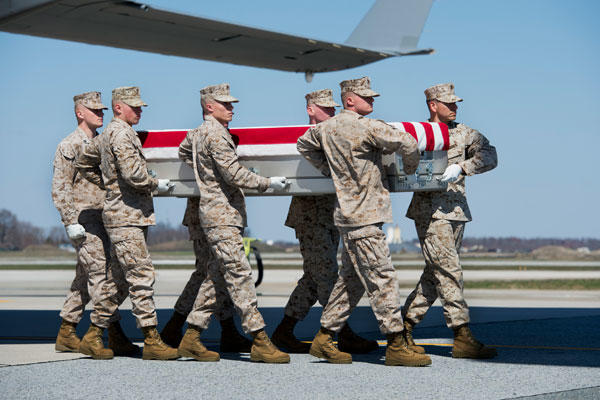The commandant of the Marine Corps paid tribute to a staff sergeant killed by Islamic State rocket fire in Iraq last week, shedding new light on the circumstances surrounding the loss.
Staff Sgt. Louis Cardin, 27, a member of Battalion Landing Team 2/6, 26th Marine Expeditionary Unit, was killed by indirect fire March 19 at a new artillery outpost near Makhmour, Iraq, shortly after he and a small element of Marines had detached from the MEU in order to support the small post.
Speaking at a Marine Corps Association awards dinner near Washington, D.C. Thursday night, Gen. Robert Neller said three other Marines wounded in that same rocket attack were due to arrive back in the United States that evening, headed for Walter Reed National Military Medical Center in Bethesda, Md.
Reflecting on Cardin's loss, Neller did not prevaricate about a fight that US officials still refuse to describe as a combat operation.
"The loss of a Marine is sad, but I thought about it: He was leading his Marines in combat," Neller said. "They were in indirect fire and he made sure everybody got in the bunker, and he just didn't make it in time. Is that sad? That's sad. But if you're going to go, you want to go in the fight."
During a briefing to reporters at the Pentagon on Friday, Chairman of the Joint Chiefs of Staff Gen. Joseph Dunford said the circumstances of Cardin's death, the second combat death since the coalition fight against Islamic State militants began, does not change the nature of the operation or indicate an increase in the Marines' ground combat role.
"This is not a fundamental shift in our approach to support the Iraqi forces," he said. "This happens to be what was the most appropriate tool that the commander assessed needed to be in that particular location."
In his talk, Neller encouraged Marines to remain sharp, reminding them that the Corps was forward deployed all over the world to remain ready and train for future fights.
"[Cardin's] death, and the things we see every day, from the attacks in Brussels by those murderous cowards that we're fighting, that's part of our world today," he said. "So whether [The Islamic State of Iraq and the Levant] continues to use terror to intimidate us and kill innocents, at the same time other adversaries, as they have since we've been engaged in the Middle East, are developing their capabilities to challenge us on future battlefields."
Neller also fired a shot across the bow at another geopolitical threat, hinting that Marine Corps leaders were eager to answer the saber-rattling of Russian president Vladimir Putin with a show of force.
About 1,800 Marines, he said, had recently wrapped up a massive cold-weather exercise in Norway, Operation Cold Response.
"It's the biggest exercise we've done in Norway in some time," he said. We were working to repopulate our [pre-positioning equipment] in the caves, and the Norwegians were happy to see us and I'm sure our Russian friends were paying attention. Mr. Putin has done us a great favor."
--Hope Hodge Seck can be reached at hope.seck@military.com. Follow her on Twitter at @HopeSeck.





























